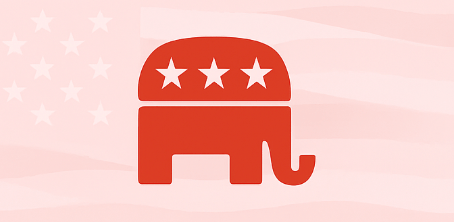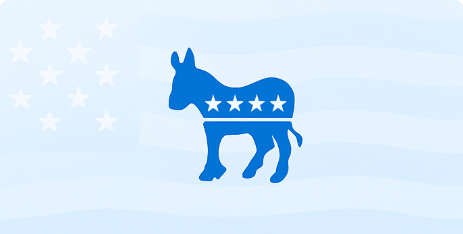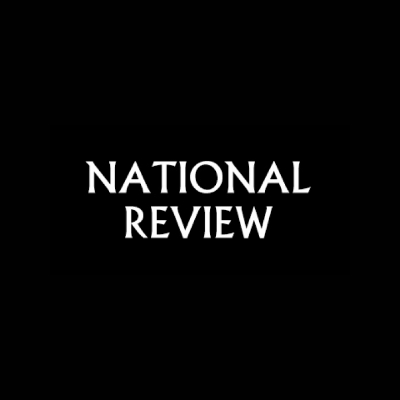How News Sources Portray International Involvement Policies
This chart shows how major news sources across the ideological spectrum frame international involvement policies, from left to right-leaning perspectives.
International involvement refers to the United States’ proactive participation in foreign affairs. Presidents are primarily vested with rights and privileges aimed at advancing alliances with other countries. Therefore, foreign policy is one of the most critical aspects of the President’s job. However, some speculate as to whether or not a President is performing his role to the best of his ability. As it pertains to President Biden’s role as the facilitator of foreign relations, nearly nine-in-ten Democrats (88%) express confidence in Biden’s ability to handle foreign affairs, compared with only 27% of Republicans. The sentiments expressed by each side of the aisle are shared within their corresponding party leadership in government. As for Republican politicians, Ted Cruz (R-TX) stated that “Biden’s foreign policy has been a catastrophe for the national security of the United States and the safety and prosperity of Americans.” On the other hand, Democratic representative Nancy Pelosi believes that Biden’s foreign policy “will revitalize our foreign policy leadership: refreshing our alliances, re-energizing our commitment to our values and interests, rebuilding our institutions and reevaluating and strengthening the tools in our diplomatic arsenal.” Check out Biasly’s Politician Bias Chart for an in-depth ideological spectrum of the United States’ most popular politicians.
A partisan divide is seen in support for an active U.S. global role. A 2017 survey by the Pew Research Center found that a majority of Democrats and Democratic leaners (56%) believe the country’s future should be actively engaged in world affairs, compared with 39% of Republicans and Republican leaners who hold the same view. When it comes to dealing with U.S. allies in global affairs, a majority of Democrats and leftists (74%) say that the U.S. should take its allies’ interests into account when making foreign policy decisions, compared with 41% of Republicans.
The Republican Stance on International Involvement
Regarding President Trump’s role as the facilitator of foreign relations, nearly three-fourths of Republicans (73%) are more likely to express that Trump is putting the United States in a stronger position internationally, whereas 85% of Democrats are far more likely to say that his policies are weakening the country’s global standing.
The republican stance on international relations has favored an “America First” approach to foreign policy, prioritizing U.S. national interests over multilateral cooperation. This involves making decisions based solely on U.S. interests without necessarily considering the perspectives or needs of allies, thereby encouraging a national policy of avoiding involvement in world affairs. This entails implementing trade policies designed to protect American industries and workers, often through the use of tariffs or renegotiation of existing trade agreements. These policies have pushed for reducing U.S. military involvement in foreign conflicts unless directly tied to national security interests and resisting international agreements or institutions perceived as infringing on U.S. sovereignty. This has been exemplified through tightened border controls and the implementation of stricter immigration policies.
Politicians Who Oppose International Involvement Rights

Three-fourths of Republicans (73%) are more likely to express that Trump is putting the United States in a stronger position internationally.
The Democratic Stance on International Involvement
The Democratic stance on international relations prioritizes the promotion of democracy, human rights, and liberal values globally. Democrats tend to favor a multilateral, liberal internationalist approach to foreign policy, emphasizing cooperation with allies and international institutions. Foreign policy efforts often focus on promoting economic engagement and trade, seeking to advance American economic interests and competitiveness globally, while addressing specific issues such as climate change, public health, and sustainable development.
This approach revolves around a continued commitment to NATO, emphasizing the importance of maintaining strong ties with allies and upholding collective defense commitments. Democrats typically support robust engagement with and funding for United Nations (UN) programs and peacekeeping missions. Support for international trade policies is evident in the parties’ emphasis on labor and environmental standards in trade deals.
Democrats often push for stronger protections in these areas when negotiating international trade agreements. Furthermore, left policy stances favor more generous refugee resettlement policies and increased aid for displaced persons globally.
Politicians Who Support International Involvement Rights

85% of Democrats are far more likely to say that Trump’s policies are weakening the country's global standing.
Political Polarization and U.S. Foreign Policy
Political polarization in the United States has shaped the country’s foreign policy approach, from its handling of specific international conflicts to its engagement with global institutions. The divergent perspectives and priorities of the two major parties have had a significant impact on the formulation and implementation of U.S. international policies. This is evident across various domains, such as each party’s approach to global conflicts and attitudes towards international institutions.
Republican and Democratic parties have taken different stances on specific international conflicts, such as the US-led coalition against ISIS in Iraq and Syria. While both parties supported the intervention, there were differences in the degree to which they invoked international legal arguments to justify the military action.
There are further differences between the Republican and Democratic parties in their support for international organizations, such as the International Criminal Court (ICC). While the US public’s support for the ICC has increased over time, the Republican government has been more ambivalent or even hostile towards the ICC, in contrast to the Democratic Party, which has been more supportive.
Global Environmental Governance
Significant polarization exists between Republicans and Democrats regarding global environmental governance. The Republican Party, especially its conservative faction, has been critical of the scientific consensus on climate change and has opposed policies that would significantly reduce greenhouse gas emissions. They tend to prioritize economic growth and development over environmental protection. Under the Trump administration, the United States withdrew from the Paris Agreement, citing concerns about the agreement’s impact on the U.S. economy and the perceived unfair treatment of the country. This was a significant reversal from the previous Democratic administration’s support for the agreement.
In contrast, Democrats have advocated for more ambitious climate action and emissions reduction targets, aligning with the goals of the Paris Agreement. They are more likely to support policies that promote renewable energy, emissions regulations, and climate change mitigation. Under the Obama administration, the U.S. was a leader in the Paris Agreement negotiations and committed to significant emissions reduction targets. The Biden administration has also made climate change a key priority and rejoined the Paris Agreement after Trump’s withdrawal.
A Brief History of International Involvement in the U.S.
The Republican and Democratic parties have taken different stances on specific international conflicts over the years. The Democratic Party’s efforts to advance democratic principles have been reflected through the U.S. policy on Taiwan, as exemplified by the Democratic Progressive Party (DPP), which has advocated for greater Taiwanese independence.
The Republican Party’s approach to Taiwan has evolved over time. The administration of Dwight D. Eisenhower maintained a policy of “strategic ambiguity” towards Taiwan, seeking to balance relations with both Taiwan and mainland China. This approach continued under subsequent Republican administrations, including that of Ronald Reagan, who reaffirmed the U.S. commitment to the “One China” policy while also strengthening ties with Taiwan.
During the Cold War, Republicans were generally more supportive of interventionist foreign policies aimed at countering the Soviet threat, while Democrats were more cautious about military involvement abroad. For example, the Republican administration of Ronald Reagan significantly increased defense spending. It supported anti-communist rebel groups in conflicts like Afghanistan and Nicaragua, while the Democratic administration of Jimmy Carter emphasized human rights and negotiated arms control treaties with the Soviets.
This partisan divide has continued to impact the United States’ stance on Russia and Ukraine. While both parties have generally supported providing military and economic aid to Ukraine, there have been some differences in their approaches. Some Republican members of Congress have been more skeptical of the level of US involvement and have called for a greater focus on threats from China. At the same time, Democrats have tended to emphasize the importance of supporting Ukraine to uphold democratic values and counter Russian aggression.
To explore how each political party views other key policy topics, visit Biasly’s complete list of Politicians’ Policy Stances. If you want to unlock more data-driven insights into media bias, explore political leanings with research-backed tools, and customize your news feed around what matters most to you, sign up for Biasly Premium News Membership.











































